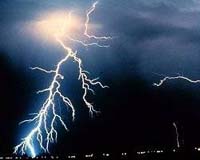| . |  |
. |
Baghdad (AFP) July 17, 2009 Sitting in an emergency room, Saadi Ibrahim held an oxygen mask up to his face, his voice barely rising above a whisper, the casualty of Iraq's latest scourge -- sandstorms. "I cannot stand these sandstorms, I cannot breathe," the 46-year-old said in central Baghdad's Ibn Nafis hospital. Since the onset of summer, such storms have struck Iraq on a near-daily basis, making day-to-day life even tougher than it already was -- hospitals have treated hundreds for respiratory problems, and the capital's international airport has had to cancel dozens of flights due to poor visibility. During particularly violent sandstorms, Iraqis walk down the country's streets wearing surgical masks, sold by roadside vendors for 250 dinars (20 US cents) each. Though sandstorms have always been a feature of Iraqi life, their frequency has risen markedly this year. "I've never had a problem like this," Ibrahim said, in between breaths into his oxygen mask. "There have been storms from time to time, but this year I have really suffered." Iraqis' attempts to cope with the sandstorms are rendered even more difficult because of the sporadic electricity supply -- unable to close their windows, they must allow air, and sand into their homes because of the 50 degree C (122 F) heat. "Every time there is a sandstorm, I know I will have problems breathing," said another hospital patient, Amin Hussein. "We only have a few hours of electricity at the house, and we have to keep our doors and windows open -- it's just too hot." -- Not a week goes by without one -- ------------------------------------ According to Iraqi authorities, desertification of the country and a severe drought which has persisted for two years has raised the risk of sandstorms, which affect the entire region. "In the 1990s, there was an average of eight days with sandstorms per year," said Ibrahim Sharif, who heads the environment ministry department charged with battling desertification. "Now, not a week goes by without one," he said. "Iraq is an arid, or a semi-arid zone. The absence of precipitation for several seasons has destroyed vegetation. And when there is a lack of vegetation to hold the soil or the sand, the wind prevails." According to Sharif, the wars that have embroiled Iraq for nearly three decades are also to blame -- military vehicles destroyed green areas in the south and the centre of the country, providing dust that was carried by a "shamal" wind that blows over Iraq in the summer. The only solution, Sharif said, was to promote and regenerate vegetation in Iraq, which has seen its number of famed palm trees drop by two-thirds, from around 36 million to just 12 million. "Iraq needs a general strategy that should be implemented jointly by the ministries of agriculture, environment, education, water and science," he said. "At the moment, there are several small projects which are not coordinated." The problem is also developing into a regional diplomatic one -- Iraq's neighbour Iran has blamed Baghdad for its own sandstorms, and Iraqi Prime Minister Nuri al-Maliki has signed an agreement with an Iranian environmental protection agency. "The prime minister has promised that the government provide any assistance to the ministry of environment to combat the problem of sandstorms which affects the environment and health" of Iraqis, Maliki's office said. But in a war-ravaged country like Iraq, the environment risks being left behind as other pressing challenges such as national reconciliation and reconstruction or the fight against insurgents take the fore. Share This Article With Planet Earth
Related Links Weather News at TerraDaily.com
 Lightning kills 35 in eastern India
Lightning kills 35 in eastern IndiaPatna, India (AFP) June 29, 2009 At least 35 people including eight children were killed after they were struck by lightning in the adjoining eastern Indian states of Bihar and Jharkhand, officials said Monday. Around 18 people were killed late Sunday by bolts of lightning across Bihar, including six children, State Disaster Management Minister Devesh Chand Thakur said. "The children were playing in the pre-monsoon show ... read more |
|
| The content herein, unless otherwise known to be public domain, are Copyright 1995-2009 - SpaceDaily. AFP and UPI Wire Stories are copyright Agence France-Presse and United Press International. ESA Portal Reports are copyright European Space Agency. All NASA sourced material is public domain. Additional copyrights may apply in whole or part to other bona fide parties. Advertising does not imply endorsement,agreement or approval of any opinions, statements or information provided by SpaceDaily on any Web page published or hosted by SpaceDaily. Privacy Statement |